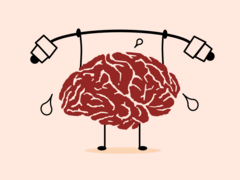Many people who have recovered from COVID-19 still suffer long-term effects from the terrible virus. From fatigue to loss of smell, to depression and anxiety, there are a wide variety of long-term conditions caused by COVID-19. One condition especially frustrating for patients is known as “COVID-19 brain fog.
 According to Harvard Health, COVID-19 Brain Fog is the term used by patients to describe their feeling that their thinking is “sluggish, fuzzy, and not sharp.” Doctors can run tests on patients who feel like they are suffering from this condition; however, oftentimes the tests come back normal. Scientists have several theories regarding the cause of brain fog. For one, COVID-19 can have lingering effects not related to the brain. As I mentioned earlier, patients can suffer from various conditions, which can distract them, impairing their ability to think clearly.
According to Harvard Health, COVID-19 Brain Fog is the term used by patients to describe their feeling that their thinking is “sluggish, fuzzy, and not sharp.” Doctors can run tests on patients who feel like they are suffering from this condition; however, oftentimes the tests come back normal. Scientists have several theories regarding the cause of brain fog. For one, COVID-19 can have lingering effects not related to the brain. As I mentioned earlier, patients can suffer from various conditions, which can distract them, impairing their ability to think clearly.
Health Matters interviewed neurologists Dr. Mitchel Elkind and Dr. Alexander Merkler to learn more about COVID-19 Brain Fog. The doctors noted that patients can sustain brain damage from a stroke during their CO VID-19 infection, and this would be an obvious cause for cognitive differences; however, Dr. Elkind mentioned that “some people seem to have this brain fog out of proportion to their illness.” In theory, patients who had mild coronavirus symptoms should not have long-lasting cognitive effects, but the medical community is finding that they do. One possible explanation is immune system activation.
VID-19 infection, and this would be an obvious cause for cognitive differences; however, Dr. Elkind mentioned that “some people seem to have this brain fog out of proportion to their illness.” In theory, patients who had mild coronavirus symptoms should not have long-lasting cognitive effects, but the medical community is finding that they do. One possible explanation is immune system activation.
Like any virus, when the immune system releases molecules to help itself fight off  SARS-CoV-2, some of the molecules can affect the nervous system. Sometimes the body can overreact and start attacking normal cells, which is when we start seeing effects such as COVID-19 Brain Fog. The immune system recognizes the viral proteins, but sometimes it mistakes similar-looking proteins in the brain and ends up attacking those. Fortunately, scientists are researching possible treatments for this devastating condition.
SARS-CoV-2, some of the molecules can affect the nervous system. Sometimes the body can overreact and start attacking normal cells, which is when we start seeing effects such as COVID-19 Brain Fog. The immune system recognizes the viral proteins, but sometimes it mistakes similar-looking proteins in the brain and ends up attacking those. Fortunately, scientists are researching possible treatments for this devastating condition.
At Augusta University, researchers are developing a drug to treat COVID-19 Brain Fog. It has not been tested yet, but the drug is a polyphenol molecule. One polyphenol molecule, EGCG, inhibits SARS-CoV-2 from binding to host-cell receptor ACE2, thus preventing the virus from entering the host cell. Dr. Stephen Hsu, Professor of Oral Biology and Oral Health and Diagnostic Sciences at Augusta believes that in combination with EGCG technology, EC16, will “yield benefits for Long-COVID relief and protection.”
AP Bio Sidenote 🙂
This connects to AP Bio through the possible treatment of brain fog. EGCG acting as an inhibitor connects to receptor-mediated endocytosis because it blocks the ligand, in this case SARS-CoV-2, from binding to ACE2 and so the cell does not accept the SARS-CoV-2.
I chose this topic because I am interested in the long-term effects COVID-19 has on individuals as well as society.


deukaryota
Hi Liobiotic- I loved reading you post. It is well written and I’m especially interested in the topic since I myself suffered (and occasionally continue to suffer) from post-COVID-19 symptoms, especially brain fog. After reading your post, I’m wondering why the EGCG inhibiting SARS- CoV-2 hypothetically works to prevent brain fog specifically. Post-covid centers such as https://www.mountsinai.org/about/covid19/information-resources/center-post-covid-care work with patients with brain fog after they have already recovered from the virus, and, speaking from experience, the symptom does not usually appear until weeks after infection. With this in mind, and the fact that EGCG inhibits the virus while it is active and trying to spread, how would this correlate to preventing brain fog, as opposed to lessening the symptoms of the original infection? (also because brain fog also occurs in patients with mild COVID-19 symptoms) Thanks againfor sharing!